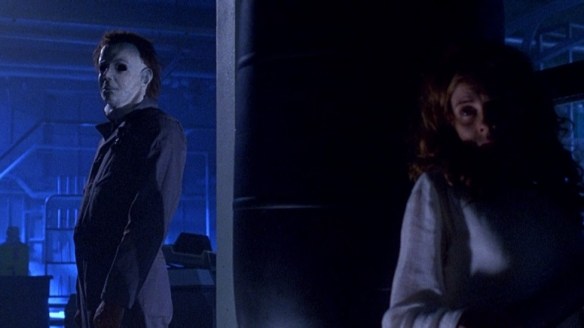Hello folks, and welcome back to Wrong Every Time. This week I’ve been balancing work priorities against the duel sirens of Blue Prince and Balatro, each of which would dash me against the rocks and drag me down to a briny doom if I gave them even the slightest inch. It is exceedingly easy for me to get addicted to roguelikes, but with both a fast-paced pump-up roguelike in Balatro and a meditative cooldown roguelike in Blue Prince, I could theoretically balance my energy between them indefinitely, living forever within a mixture of labyrinthian manors and outrageous poker combos. I’m even seriously considering constructing my own Pepe Silvia board of Blue Prince family relations, all so I can… I dunno, unlock a door holding a key that unlocks a different door? It’s dire out here, but fortunately our film screenings have continued unabated, alongside regular Dimension 20 episodes that are seriously opening my third eye regarding dungeon mastering possibilities. Let’s get to the films!
Our march through Michae Myerl’s less-distinguished adventures continued with Halloween 6, where wouldn’t you know it, Michael and Jamie have both been abducted by a cult of evil druids. After Jamie gives birth to some kind of presumed devil child, she escapes back to Haddonfield with Michael in swift pursuit. Then Loomis shows up, the druids pull more shenanigans, Paul Rudd is there… look, the script for this one went through a number of revisions, and the only coherency you can really count on from the final result is that Michael will surely stab some motherfuckers.
Yeah, there’s basically nothing to recommend this one in terms of traditional cinematic merits. It’s nice to see Donald Pleasance one more time, but the unintentional “star” of this film is absolutely Paul Rudd, who attacks his first film role with lunatic enthusiasm. Rudd will eventually learn to use his verging-on-serial-killer-energy charisma for intentional comedic effect; here, his comedy is all unintentional, a wildly out-of-step interpretation of a role that was presumably supposed to frame him as Dr. Loomis’ Michael-hunting successor. One unfortunate set of box office returns later, that plan was clearly scuttled for the emergency lever of “bring back Jamie Lee Curtis,” and thus his performance remains isolated within this emphatically mediocre picture.
We then continued our journey through the bountiful V/H/S universe with V/H/S 85, an installment unified through the exceedingly loose mandate of “all these stories were allegedly filmed in 1985.” Of course, it’s never the theme that dictates the strength of a V/H/S; it’s the quality of its component entries, and as far as that goes, I’d say that 85 is the genuinely scariest installment in the franchise so far.
Concepts range from the revival of Aztec deities to a one-woman stage play centered on the “God of Technology,” each sequence concluding in some awful new variation on fire and blood. There are basically no weak installments here, and several invoke a vivid queasiness in their conceptions of the supernatural or visceral approach to dismemberment. But one in particular stands alone – “Dreamkill,” written and directed by Sinister/The Black Phone director Scott Derrickson.
If you’ve seen Sinister, you know well that Derrickson’s approach to unmediated, allegedly “found” video is utterly stomach-churning. That film stands as one of the most effective of the post-Insidious productions, presenting images that linger in the mind through their combined immediacy and audacity, and Dreamkill offers a convincing demonstration that his talent for conjuring genuine nightmares clearly hasn’t diminished. It’s a rare film that actually unsettles me these days, so I’m thankful there’s still shit like Dreamkill out there to make me leave the light on.
Our next viewing was Sorceress, another Roger Corman-produced piece of sword and sorcery fluff from the genre’s post-Conan heyday. The plot, such as it is, involves an evil wizard attempting to sacrifice his first-born child in order to gain tremendous power. However, his twin daughters are saved by the intervention of a much nicer wizard, and they grow up to become powerful warriors who eventually challenge their father with the help of an errant prince, noble dwarf, and satyr.
Corman essentially tricked exploitation theater legend Jack Hill into directing this one, promising an impressive special effects budget and delivering a back lot somewhere in Mexico. The film’s tone follows the general model for these Corman toss-offs, with a fair amount of nudity, dubious sword fighting sequences, and charmingly clumsy depictions of alleged gods shooting laser beams at each other.
The only noteworthy thing about this one is its aesthetic inspiration; the usual Arthurian or wild west influences are here traded for narrative devices, costume designs, and godly names that evoke both Hindu and Norse mythology, making for a somewhat unique (if still clumsily realized) fantasy world. Sadly, as Hill himself complained, “the dialogue was unfortunately all dubbed by amateurs and office employees,” and the clear disinterest of the villain’s alleged voice actor does a merciless job of undercutting any sort of dramatic tension. Not great even by Conan also-ran standards.
Last up for the week was Viva Las Vegas, a ‘64 musical drama starring Elvis Presley as Lucky Jackson, a young man who journeys to Las Vegas in order to compete in its first annual Grand Prix Race. However, his attention is swiftly diverted by the appearance of Rusty Martin (Ann-Margret), the dazzling swim instructor of a local hotel pool. While working to earn the money for a new engine, Lucky endeavors to win Rusty’s heart in the bargain, facing off against the suave Count Elmo Mancini (Cesare Danova) in matters both romantic and automotive.
The film’s narrative is mostly just a loose framing device for celebrating the film’s true passions: rock and roll music, the classic Vegas strip, and the preposterous chemistry shared by Presley and Ann-Margret. It succeeds famously in all three pursuits, offering a wide array of lovingly choreographed rock numbers, giddily ushering us through the glittering lights and showgirls of the strip, and simply getting out of the way of its two stars, whose off-screen affair translates to an electric on-screen dynamic.
I’d never seen Presley in a film before, and goddamn is he ever charming, a terrifyingly effective mixture of drawling swagger and boyish whimsy. I’d figured he was simply someone too famous, at a time when fame was globally all-encompassing, to entirely avoid the silver screen, but he seems as confident and natural sweet-talking Ann-Margret or embracing a pratfall as he does crooning from the stage. And though the film is largely disinterested in its own grand prix plot device, it nonetheless concludes on a thrilling race where no less than three contenders spin off into inexplicably violent, undoubtedly fatal crashes. Hail to the king, baby.




